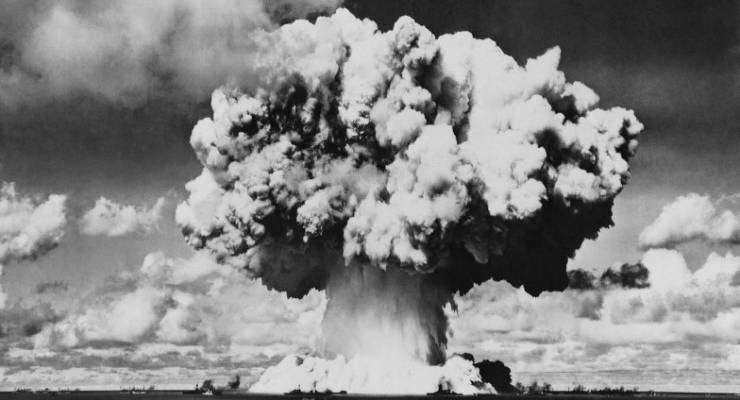
The bad news? One week of nuclear warfare could cause 2 to 5 billion famine-related deaths (depending on who pushes the button). The better news? Australia has been nominated alongside New Zealand as the most liveable country in such a scenario, according to research released today.
Any good news? A flat “no”, says author Ryan Heneghan.
“We had six different scenarios based on how many weapons are used,” Heneghan tells Crikey. “It ranges from a relatively ‘small’ exchange between India and Pakistan to a ‘global holocaust’ all-encompassing Russia-US situation. There’s no such thing as a limited nuclear war; it doesn’t exist.”
Unlike conventional war, Heneghan says conflict cannot be localised when things turn nuclear: “The power of weapons impacts the climate. They put a lot of soot out into the atmosphere which effectively acts as a giant shade cloth. It creates a global catastrophe.”
The report, from the Queensland University of Technology and Rutgers University, tackled the nuclear option, but the modelling doubles as a preparatory framework for smoke-pumping and air-polluting natural disasters that have a similar impact.
Throughout history, the soot loads of volcanic eruptions and (to a lesser extent) megafires have induced changes to global food production capacity.
The 2019-20 Australian bushfires released 1 million tonnes of soot into the atmosphere. Although devastating, this is one-fifth of the report’s smallest nuclear scenario. In 1783, Iceland’s Laki eruption thrust the world into darkness and fuelled food shortages with less rainfall, less sunlight and cooler temperatures that crippled crop yields.
The trials and tribulations of the infamous year 536 are also believed to be part of a similar phenomenon.
“It was widely deemed the worst year in history,” Heneghan says. “People all over the world were writing that the sun didn’t show, crops wouldn’t grow, it was extremely cold, and all evidence suggests it was due to a large volcanic eruption.”
So would we rather volcanic eruption or nuclear warfare? Neither. “Both scenarios are pretty nightmarish, but we wouldn’t want to cause this to happen. We can’t control volcanic eruptions, but we can control nuclear.”
Heneghan says that although the paper posits Australia would have enough food, it was “optimistic”: “Just because we could grow enough food, doesn’t mean we’d have the resources to do so.”
What would you do first if the bomb went off? Let us know your thoughts by writing to letters@crikey.com.au. Please include your full name to be considered for publication. We reserve the right to edit for length and clarity.








Location location location!
Aussie home owners look forward to their property values increasing dramatically after the nuclear war, which 80% LNP voters now strongly support.
When asked to comment, Barnaby Joyz said “The price of not having a nuclear war would condemn millions of fair-dinkum battlers to decades of unnecessary mortgage stress.”
“Sure, not having a nuclear war might be a nice ideal in fairy land, but for those of us living in the real world, we’re just focussed on paying off our mortgages as soon as possible, keeping power prices down and getting ahead.”
For those looking for the “money” paragraph in the article (the bits about Australia and New Zealand), here ya go.
Is there anyone out there old enough to remember the movie “On The Beach”…I think that was what it was called.
Everyone on the Australian mainland was trying to get to Tasmania, which was the last refuge following a nuclear war in the northern hemisphere. Some made it…some didn’t. Everything old is new again, it seems!!
Good movie. Two have been made using that title.
An even better book (by Neville Shute)………..
…………..as it didn’t require the artificially inserted “romance” hook to make it saleable.
In the 1957 Shute book Capt Towers (sic!) the septic sub commander seemed more in love with his sleek penile substitute than Moira.
He leaves her to the radiation swirling about Melbourne when he takes it to sea to scuttle it – better dead than Red.
The crew vote to go home to their dead country, and it is his duty as captain. She would not have fitted in on the sub, except as mutiny fodder. And the Reds are already dead. The US base at the South Pole would be the last animal life on planet Earth. Fred Astaire tapped out too.
Thanks TonyP. Upon reflection, I may be talking about the book, written by Neville Shute, as I think in the earlier film most of the action was set in Melbourne. Anyway everyone dies in the end…very depressing!
Reputedly filmed in Melbourne during the Moomba festival………….
Try “Down to a Sunless Sea” by David Graham in 1979.
I loved the final twist in the plot.
Me too.
If it, gets to the last few minutes of desperate dodging and decision making, the Russians will die fighting and let the unstoppable reserve mechanism go. Also, Russia will not let China go, even partially. The USA is the rogue murdering, occupying, invading, maggoting, thieving nation to cause an end to us all by sheer greedy ambitious triumphal stupidity.
Nicely put.
Well it would still be wise not to live anywhere near Pine Gap, Darwin, Canberra Melbourne and Sydney. I’m pretty safe, no one knows where I squat.
Your IP might as well be a homing beacon.